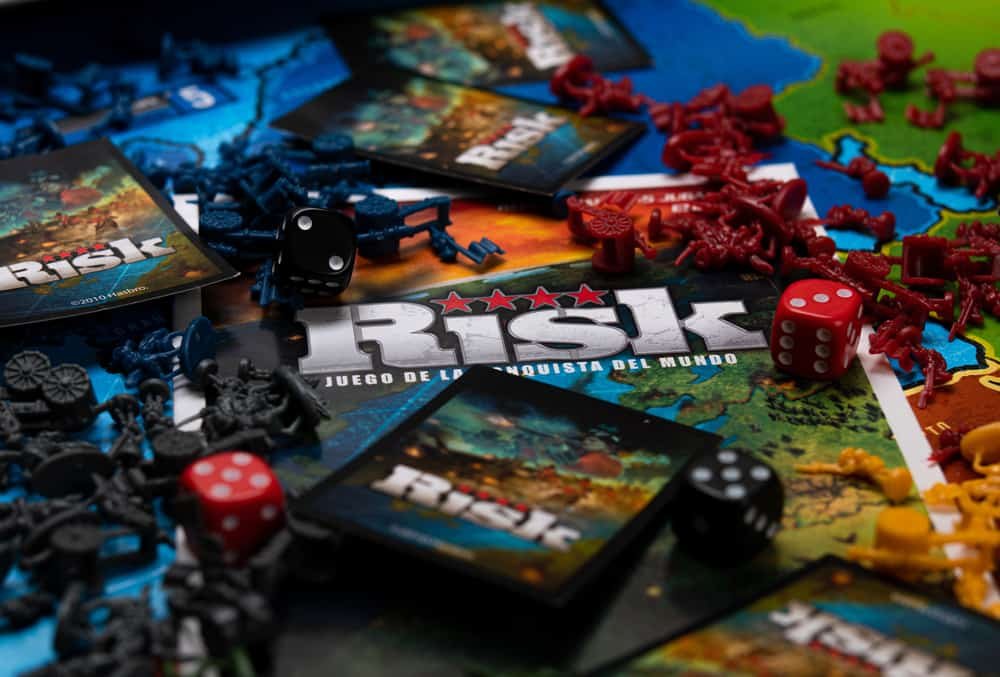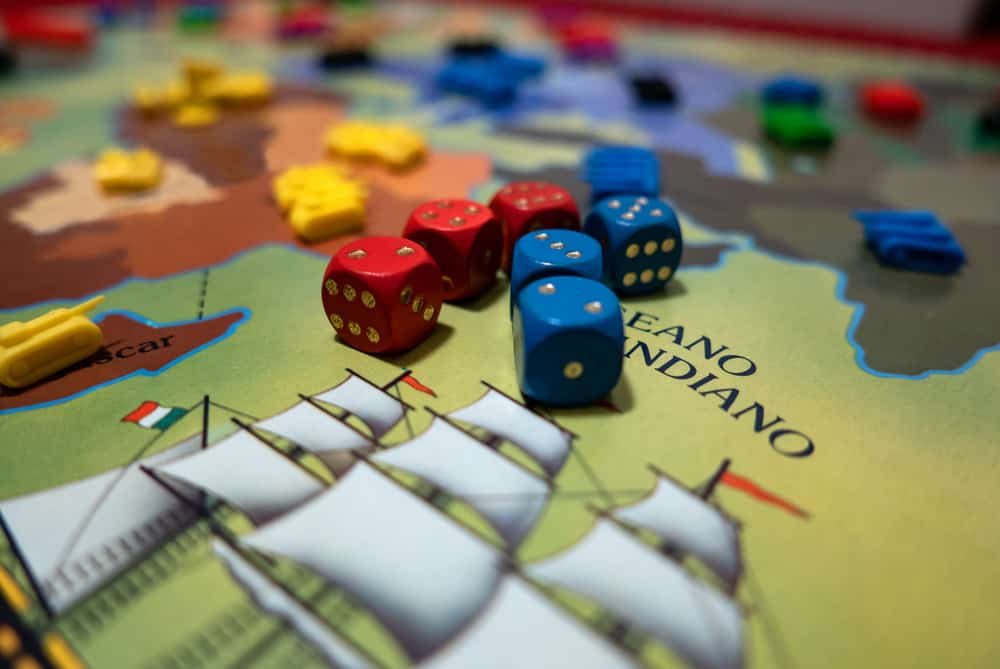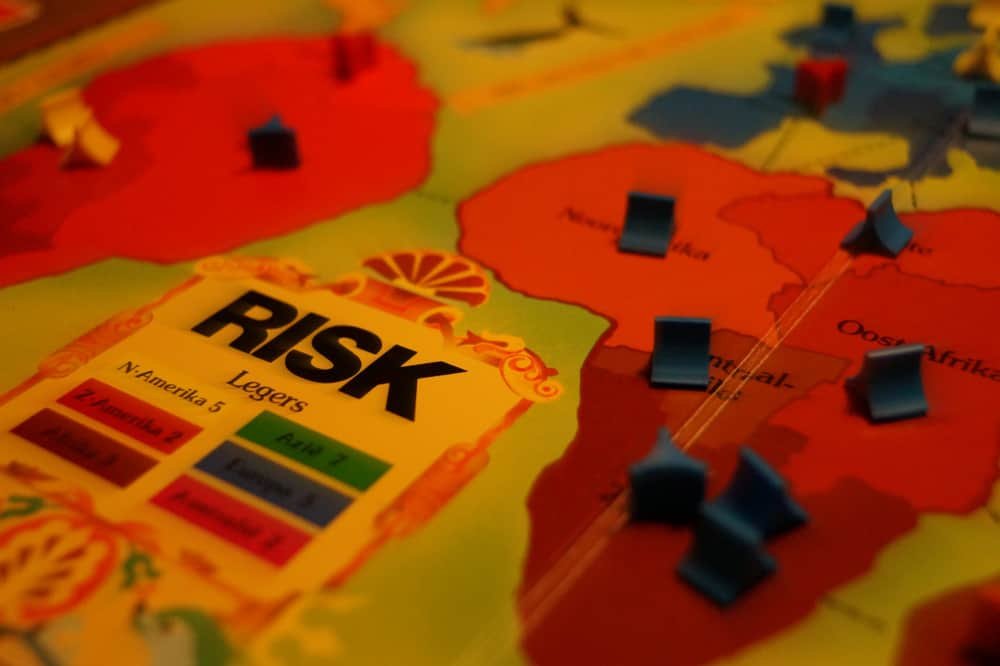Last Updated on January 7, 2024 by Gamesver Team and JC Franco

Risk is a game that has stolen many hours of my life. From my childhood years, I can remember battling it out over the board with my dad and fighting over strategy when pairing up with one of my siblings. All along the way I have tried to glean new and strategic ways to improve my game and increase my occurrences of winning. At no point have I ever considered if Risk is a solved game of not; until now.
Risk is not a solved game because it’s a complex game that involves elements of luck, as well as a considerable amount of strategy and skills. Luck comes into Risk because players must use a dice (and cards), which takes away choice and introduces chance to the game.
In short, while there are many things that you can do to increase your chances of winning at Risk, there is nothing that you can do to ensure it. I have spent years improving my game and learning new and interesting strategies that have, in many instances, ensured a higher chance of winning. I have never been guaranteed a win, though. Every time I have reached for the dice to roll it, I have experienced luck, which has totally changed the course of the game and eliminated the surety of me winning.
If you would like to learn more about Risk as an unsolved game, read on.
What is the Meaning of a “Solved Game”?
Before you even consider if Risk is a solved game or not, you are probably wondering what a solved game actually is. What does that even mean? Is there a specific meaning to the term “solved game”? What is a solved game? A solved game is typically a 2-or-more person game where the theoretical result of the game is known without a doubt.
Basically, if a game is solved, there is a series of moves that both players need to make that will ensure an outcome; every time. There are various ways in which a game can be solved. Below are 3 levels in which a game can be “solved”.
What are games that are ultra-weakly solved?
If a game is ultra-weakly solved, it means that in a scenario of perfect play, the player who starts first can/will win every time. Even though this means that the game can be won every time, there is no actual algorithm involved or series of known moves that produce this result.
What are games that are weakly solved?
If a game is a weakly solved, it means that the theoretical outcome of the game is known from the very beginning. There are algorithms and series of moves that must be followed to produce a win for a player. If a player knows precisely what moves to follow to ensure that they win a game, then it is a weakly solved game. This usually involves the player that wins being the starting position player, and the moves must be followed from the very first move.
What are games that are strongly solved?
If a game is strongly solved, it means that there is an algorithm or series of definite moves that a player can make from absolutely any position – instead of just the very first starting move – that will bring about a definite win for the player.
Increasing Your Chances of Winning at Risk with Mathematics

Okay, so Risk is not a solved game, but is there anything that one can do to ensure that we win more or have a greater chance of winning at the game? Of course, there is. In fact, there is an interesting article published by Business Insider that implies you can use mathematics to increase your chances of winning.
The article is based on the Risk board (which is the world map) divided into sections as per Garret Robinson’s paper. Robinson is a graduate of MIT in 2009 that focused on outlining the mathematical advantage one can have when playing Risk.
After studying his division of the map, you begin to realize how many vulnerable points each territory has. He also advises to be fully aware of which continents have the highest return on holding territories. You should know that you get the following bonus armies for every turn you hold each of these continents:
- Australia – there are 4 territories, and you will get 2 additional armies per turn.
- Africa – there are 6 territories, and you will get 3 additional armies per turn.
- South America – there are 4 territories, and you will get 2 armies per turn.
- North America – there are 9 territories, and you will get 5 armies per turn.
- Europe – there are 7 territories, and you will get 5 armies per turn.
- Asia – there are 12 territories, and you will get 7 armies per turn.
Doing simple mathematics can help you to aim for territories that get you decent additional armies as a result. Of course, playing Risk is about more than gathering additional armies. You also have to minimize the chance of your opponents taking one territory and stripping you of your continent bonuses. For more clarity, you should check out the Business Insider article on Risk.
Other Strategies To Increase Your Chances of Winning at Risk

Just because Risk is Not a solved game and there are no definite series of moves that you can do to ensure a win, there are things that you can do that will increase your chances of winning. Some of these things are listed below (I use these strategies – perhaps you should too).
- Observe the game and the players as much as possible. Always know where your opponents are on the board and always be thinking about what their next possible move might be.
- Make sure that you do not set yourself up to be an easy target after random card draws. For instance, if you receive 3 or more territories in a continent, resist the urge to try to dominate that continent immediately. Place some of your troops in those territories, but also create a backup plan by placing troops in other territories. If your troops are all in the same territory early on in the game, you might be a weak target.
- Be strategic about placing and building large armies. Make sure that the territories where you are building armies do not have multiple points of attack. If you do, your opponents will seize the opportunity to attack the moment they notice that the size of your army is growing.
- Aim to dominate small continents first. These have fewer attack points and are easier to hold. As it turns out, other players might not give it much attention if you are dominating a small continent, so they will not interfere with your progress too much. Aim for Australia or South America.
- Strike up relationships with other players to defend against opponents who are strong or becoming a threat. Allies are important in a game of risk, but it is also important to ditch allies once the common goal or objective is achieved. Keeping allies for too long in the game can set you up for a loss.
- You can delay turning in cards for quite some time – do that! You can turn in cards when you have a set of 3, but you can actually hang onto them until you have a set of 6. Do not be in a hurry to turn cards in, but once you reach 6 cards, try not to hang onto them for too long.
- When you plan your final big move (risk) in an attempt to win the game, make sure that you move your army along strategically and systematically. It is important to defeat your opponents meticulously instead of haphazardly.

Last Word
While Risk is not a solved game and there is no definite way for you to plan a win (thanks to the rolling of the dice), it does not mean that you cannot learn and implement strategies that greatly increase your chances of winning.
While it is fun to know exactly how to win a game (trust me, I love beating my siblings time and again with my knowledge of how to win Tic-Tac-Toe), it can be far more fun letting luck, chance, and strategies run their course and purely playing for the fun of it. Whether you use the above strategies or not, I sincerely hope that your next game is one that is packed with excitement and joy.

